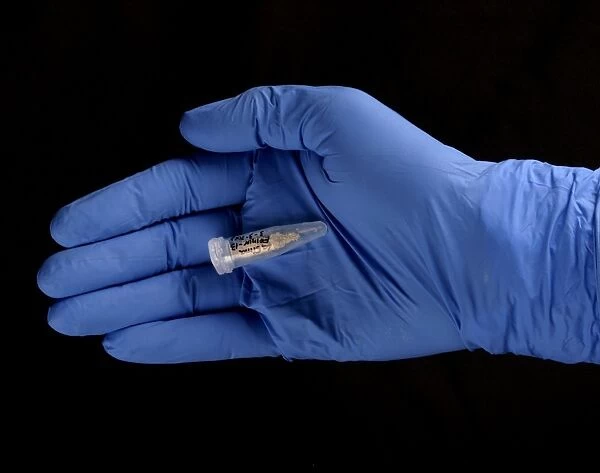Extraction of fossil DNA C018 / 6377
![]()

Wall Art and Photo Gifts from Science Photo Library
Extraction of fossil DNA C018 / 6377
Extraction of fossil DNA (deoxyribonucleic acid). Sample of material drilled from a fossilised Homo heidelbergensis femur (thigh) bone (femur 13) found at the Sima de los Huesos site, Sierra de Atapuerca, Spain. The mitochondrial DNA was extracted and sequenced. The fossil is over 400, 000 years old, making it the oldest human DNA sequence published to date (December 2013). It showed that H. heidelbergensis was more closely related to the Denisovans, an eastern Eurasian hominin, than to Neanderthals. The work was carried out in a collaboration between Centro Mixto de Evolucion y Comportamiento Humanos, Madrid, Spain, directed by Prof. Juan Luis Arsuaga and Svante Paabos department of genetics, Max Planck Institute for Evolutionary Anthropology in Leipzig, Germany
Science Photo Library features Science and Medical images including photos and illustrations
Media ID 9233933
© JAVIER TRUEBA/MSF/SCIENCE PHOTO LIBRARY
Department Of Genetics Dna Analysis Earliest Early Human Early Man Eppendorf Tube Extraction Fossil Fossil Human Fossil Man Fossilised Fossilized Genome Germany Hand Holding Hominin Homo Heidelbergensis Juan Luis Arsuaga Leipzig Mitochondrial Dna Oldest Paleoanthropology Paleogenetics Pit Of Bones Prehistoric Prehistory Preserved Sample Sampling Sequenced Sierra De Atapuerca Sima De Los Huesos Spain Svante Paabo Deoxyribonucleic Acid Genetics Laboratory Palaeontology
EDITORS COMMENTS
This print showcases the groundbreaking extraction of fossil DNA from a sample drilled from a 400,000-year-old Homo heidelbergensis femur bone. The fossil was discovered at the Sima de los Huesos site in Sierra de Atapuerca, Spain, and its mitochondrial DNA was successfully extracted and sequenced. Published in December 2013, this ancient human DNA sequence is currently the oldest ever published. The significance of this discovery lies not only in its age but also in the insights it provides about our evolutionary history. The analysis revealed that H. heidelbergensis is more closely related to the Denisovans, an eastern Eurasian hominin group, than to Neanderthals. This finding sheds light on the complex web of relationships among early humans and their close relatives. The collaboration behind this remarkable achievement involved two esteemed institutions: Centro Mixto de Evolucion y Comportamiento Humanos in Madrid, Spain, led by Prof. Juan Luis Arsuaga; and Svante Paabo's genetics department at Max Planck Institute for Evolutionary Anthropology in Leipzig, Germany. In this black-backgrounded laboratory setting captured by photographer Javier Trueba/MSF/Science Photo Library, we see a person carefully holding an Eppendorf tube containing the precious fossil material. This image symbolizes both scientific rigor and reverence for our prehistoric past as researchers strive to unlock humanity's genetic secrets buried within these ancient bones.
MADE IN AUSTRALIA
Safe Shipping with 30 Day Money Back Guarantee
FREE PERSONALISATION*
We are proud to offer a range of customisation features including Personalised Captions, Color Filters and Picture Zoom Tools
SECURE PAYMENTS
We happily accept a wide range of payment options so you can pay for the things you need in the way that is most convenient for you
* Options may vary by product and licensing agreement. Zoomed Pictures can be adjusted in the Cart.

